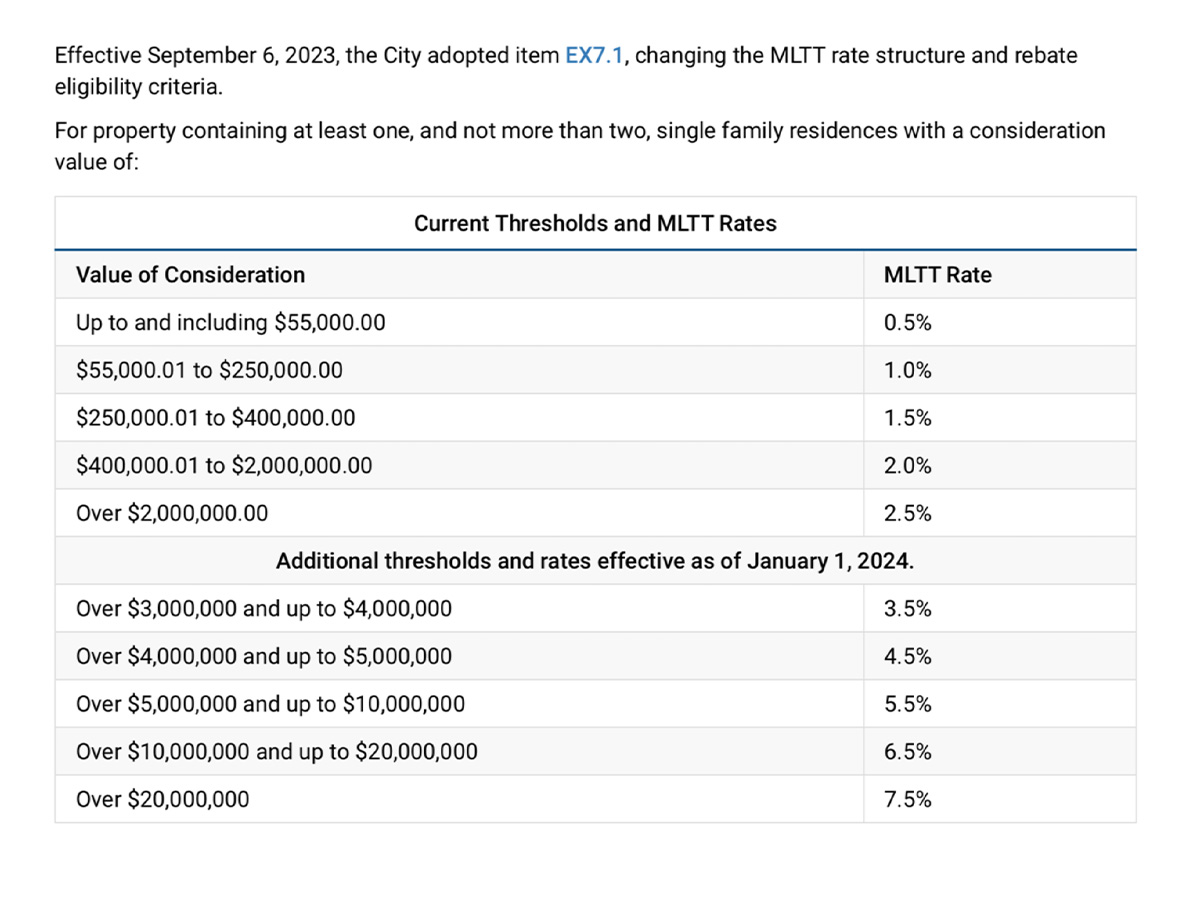Torontonians Face a Land Transfer Tax Increase for Luxury Homes
The status of the housing market in Toronto is costly, limited and competitive. With the ongoing rise in newcomers in the city, the cost of rent and strong demand, many Torontonians feel as if they are in a vice grip. Many of them are forced to relocate out of the city for affordability.
Residential prices and the number of transactions have spiked, yet we find ourselves in arguably the most desperately urgent affordability crisis Toronto has ever experienced. For context, as of 2021, according to the Toronto Regional Real Estate Board, Toronto home prices have increased by approximately 140 per cent since 2008.
Is putting a squeeze on homeowners a solution to this problem?
On September 6, 2023, the City of Toronto approved implementing the new Municipal Land Transfer Tax (MLTT) rates of up to 7.5% on high-value homes, which will take effect on January 1, 2024. However, many feel that the increase in the MLTT will serve only to erode housing affordability even further. To those who believe the tax hike will only impact the luxury-home owners “who can afford the increase,” think again.

The new MLTT Rates and Threshold, according to The City of Toronto
“The truth is there’s not a lot of prime properties in the city of Toronto that are under that $3 million price point unless you’re going into a condominium or you want something within a great neighbourhood,” says Jerry Hammond, boutique luxury real estate CEO and founder of Hammond International Properties, in Toronto.
Hammond is a leading industry expert, multi-award-winning real estate broker and trusted industry mentor. His success is held in high regard by a diverse network of high-net-worth and ultrahigh-net-worth clientele locally and internationally. Simply put, Hammond’s knowledge and expertise are not to be disregarded.
“What the government is trying to create is affordability. If we go back to our days historically, when the GST was implemented, there was a big pause for almost one year until the market adapted to the new tax. In the beginning, a lot of people didn’t want to pay the tax. So, they negotiated part of what they had to pay into the purchase price. So, there will be a dilemma going into the first and second quarters of the year especially now you’ve got a provincial tax that’s going to remain the same, and you’ve got a city tax that’s increasing,” says Hammond.
The fact of the matter is real estate is the easiest way to put a financial squeeze on the consumer.
Consider this: If it is roughly 35 cents of every dollar that is given back to the government at different levels to build a project, the expenses that a developer must incur to support the completion of the development get passed on to the consumer. If the consumer cannot pay for it, then it simply gets rolled back into the banking system through a mortgage plan that is paid off over time – it is a win-win strategy for the government.
To add insult to injury, how the capital incurred by taxes is allocated back into the city’s infrastructure is not known by the public, so government accountability is vital but unlikely to happen.
For those who find themselves ready to start a family, young adults in their 20s eager to stay in the city they were born or raised in or are newcomers determined to pursue new opportunities, it is simply our responsibility to keep that dream alive. But to keep that dream alive, your entrepreneurial mindset must act. In Canada, home ownership continues to be one of the best long-term investments. For Hammond, buying property and finding a way to facilitate it with tenants is the fastest way to build up equity.
“The rental market is going to be even stronger moving forward. Soon, the federal government is essentially going to provide a large loan to apartment-building builders to support rental housing. That’s already an indication as to where the market’s going. So, invest in real estate property, even if you rent it out or if it’s just a stepping stone to something that you need to go into later. The worst thing that any young person can do for themselves is delay the process,” says Hammond.
Before the municipal land transfer tax comes into effect in January 2024, I urge government leaders to think carefully about this dilemma and to consider all potential impacts, now and for years to come.



















































































